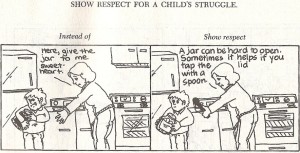Democratic Parenting
After reading this blog post on the difference between authoritarian, democratic, and permissive parenting styles, several parents have written to ask for more information about how to implement democratic parenting.
First of all, it’s important to realize that parenting is not easy, and since we don’t get a how-to guide when our children are born, we tend (for good or for bad) to treat them the way our parents treated us. Alternatively, some of us realize that we don’t like the way we were raised and don’t want to be like our parents, so we use the complete opposite parenting style – which is often equally negative.
Good parenting is hard work, and if we truly want to change our parenting style, we need education and support. Luckily, there’s lot of help out there. Some good websites for information on democratic or positive parenting are:
- Life Matters – tools for stress-less parenting.
- Positive Parenting
- Positive parenting tips for specific age groups
There are also excellent parenting books available. One of my favourites (for ease of use and because I love the little cartoon examples) is How to Talk so Kids Will Listen and Listen so Kids Will Talk by Adele Faber and Elaine Mazlish. It’s available in both English and Spanish and I highly recommend it.
For those who prefer direct coaching, other forms of support are available. Some parents choose to work one on one with a child psychologist for support in learning how to raise their children. Others find that parenting classes are the most helpful. In Santo Domingo, psychologist Emma Carolina Fernandez M.Ed offers classes to help parents become more effective. You can contact her for more information on her facebook page or at Coemma,
Since there’s so much information out there, I won’t go into great depth here. After reading many different parenting books and working with kids for 24 years, here are the tips I’ve come up with for democratic parenting. After the tips, you’ll find some examples of behavioral issues and the ways parents react to them using the three different parenting styles.
Tips:
- Be consistent. This is essential. If one day you’re democratic, but the next you’re authoritarian, your child will not trust you and won’t respond to your democratic parenting. If, on the other hand, you waver between democratic parenting and permissiveness, your children will learn to manipulate you to get their way.

- Be respectful. One way to monitor this is to listen to how you communicate with your child and think about how you would feel if someone else were speaking to your child this way. As a teacher, I remember a parent of an ADHD child telling me that she wanted me to speak gently to her son, focus on his positive behavior, and never raise my voice to him, in order to help him develop positive self-esteem. I agreed with her and did my best. But, much to my surprise, when the mother accompanied the class on a field trip, she spent her time yelling at her son, telling him he was a brat, and using put-downs to control him. She would have been horrified if I had done the same.
- Communicate. When we want children to do something, or to behave a certain way, we should let them know why: “Please write a thank you note to your grandmother for the present she sent you. It would make her happy to hear from you and to know how much you like it.” If we’re upset with their behavior we should also explain why it bothers us: “I’m upset with the way you spoke to your sister because it was disrespectful and it hurt her feelings.”
- Give choices. But make sure they’re geared to your child’s age level. To a small child who would prefer sugary cereals to healthy ones, you can say, “I’m sorry, we don’t have any _______(favourite sugary brand).Would you prefer granola or corn flakes this morning?” To a teen you can say, “It’s your allowance. It’s up to you whether you want to spend it on going to the movies or if you want to save up for a new cell phone.” Choices help children learn to think for themselves and become the independent adults we want them to become.
- Be firm. Be careful not to be wishy-washy or apologetic. Democratic parenting does not mean being a pushover. If you’ve asked your daughter if she’d prefer to clean up her toys now or in half an hour and after 45 minutes she’s still playing with her Lego bricks, instead of pleading, “Come on, you promised. Please clean your toys up now….” firmly say, “We agreed that you’d clean up in half an hour and the timer went off 15 minutes ago. Please put those Legos away now. When we have an agreement, I expect you to live up to your word.” Let your children know that you respect them, but that they must also respect you.
- Be patient. If you’re suddenly changing your parenting style, don’t expect your children to immediately respond. Change takes time. Continue to be respectful and consistent and slowly you will see a change in your children’s behavior and in your relationship with them.
Examples of authoritarian parenting (1), permissive parenting (2), and democratic parenting (3):
You want your child to take a bath and every night it’s a struggle. Tonight is no different and your child is procrastinating. You say:
- “I’m not going to say this again. Get in that tub right now!”
- “Please honey, go take a bath. If you take a bath, I’ll let you watch TV for an extra half hour tonight.”
- “Hmmm…. you need to take a bath before bed. Would you prefer to take one now, or after you watch TV for half an hour? …….After watching TV? Fine. But then I expect you to hop into the tub without complaining.”
Your child hates vegetables and absolutely refuses to eat them. You insist. He asks you why and you respond:
- “Because I said so!!”
- Oh, never mind. I hated vegetables when I was a kid too… just eat what you like.”
- “Because vegetables are full of vitamins and minerals. They’re good for you and I want you to be healthy. Why don’t you try 3 bites? You can choose either the peas or the carrots.”
Your child comes home with a discipline letter from school. She had to sit with the school counselor and reflect on her behavior, why it was wrong and how she could change it, and then write a letter explaining the situation to you. You read the letter and say:
- “You did WHAT???? I’m so upset. You’re grounded for a week and I’m taking your cell phone and your computer away! That will teach you.”
- “Oh, I’m so sorry you got in trouble. You must feel terrible. Let’s go out for ice cream so that you feel better.”
- “Hmmm… you had a rough day today. Tell me about it….” You sit down and listen to your child as she explains what happened. You don’t let her make excuses for her behaviour, nor do you make judgmental statements. Instead you focus on what she learned from the experience.
Note that the democratic response is usually the longer one…..this is because the democratic parenting style is based on communicating clearly with one’s child. The quick and easy response “because I said so” is a lot less time-consuming but, unfortunately, it’s not terribly effective.
The Home/School Connection
In The Community for Learning, we try to use a democratic teaching style and our behavioral system is based on respect for the child. Our goal is to help our students become internally motivated to do their best, to be respectful of others, and to behave appropriately because they want to, not because they’re afraid of punishment. When parents work at home to instill these same values in their kids, we have an even better chance of raising children who are self-confident, respectful and independent. Teachers and parents share a common goal. Working together, we can reach it.



Leave a comment